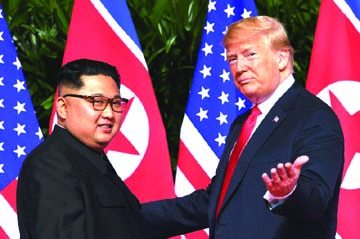
AP, Hanoi, Vietnam:
Governments across Asia on Wednesday expressed hope that a second summit between President Donald Trump and North Korean leader Kim Jong Un in Vietnam will produce concrete results that would lead to complete denuclearization on the Korean Peninsula.
Trump announced in his State of the Union address that the summit will take place Feb. 27-28.
A spokesman for South Korean President Moon Jae-in said that South Korea hopes the United States and North Korea will produce “more concrete and practical” agreements during the meeting. The leaders’ first summit in Singapore last June ended with a vague promise by Kim to work toward denuclearization, without a concrete plan on how it would be implemented.
Presidential spokesman Kim Eui-kyeom said in Seoul that Vietnam will be a “very good” place for the United States and North Korea to “write new history” in their relations.
Japan, too, said it hopes the summit will be “meaningful” and lead to the complete denuclearization of the Korean Peninsula.
Chief Cabinet Secretary Yoshihide Suga also raised the issue of Japanese nationals who had been abducted by North Korea in the 1970s and 80s, saying it remains “our most important issue” related to North Korea.
Australian Foreign Minister Marise Payne said that enforcing international sanctions against North Korea is important in assuring Pyongyang that “the world is equally committed” to its denuclearization.
“It’s not an overnight process. It is a very significant process,” she told the Australian Broadcasting Corporation from the Solomon Islands, where she was visiting. “It will require extensive negotiations with the regime.”
On the streets of Hanoi, residents held out hope that the two countries will make progress.
“The meeting is a progress made by both countries for the ultimate goal of peace. All nations, despite being enemies in the past, can always reconnect to bring peace and happiness to their people,” said Le Hong Ha, a teacher.
Tran Ngoc Duyen, a retired doctor, said that Trump “is a very determined man. If he decides to sit down for a talk with North Korean leader, it would be a good thing. Not only Vietnam but the whole world look forward to the meeting and hope for a good outcome.”
He said that the summit will also bring a positive image of Vietnam “being a country of peace and Vietnamese people welcome it.”
Their first meeting was a blockbuster piece of diplomatic theatre criticised as light on substance. But with a second date stretching over two days, Donald Trump and Kim Jong Un must make real progress on denuclearisation, analysts say.
The historic handshakes and warm smiles of the Singapore summit in June last year heralded a sea change for two men who months earlier had been threatening each other with nuclear destruction.
The bonhomie continued in the following weeks, with Trump musing that he and Kim had fallen “in love”, and frequently trailing a second date.
Delivering his State of the Union on Tuesday, Trump said the time and place was set: Vietnam on February 27 and 28.
Analysts welcomed the news, but cautioned the meeting needed to achieve something more concrete than the vaguely-worded agreement they produced last time.
“What is critical… is that President Trump’s next meeting with Kim Jong Un goes beyond the pomp and circumstance of the first to achieve real steps toward denuclearisation,” said Bruce Klingner, a senior research fellow at the Heritage Foundation.
In Singapore, the inaugural summit between the leaders of two countries that never signed a peace deal after their 1950-53 war was brief-from 9am to 2pm.
A short pronouncement-little more than a page in which Kim pledged to work towards the “denuclearisation of the Korean peninsula”-was leapt on by critics as impossibly vague.
Pyongyang wants relief from punishing UN sanctions and rejects demands for what it calls its “unilateral” disarmament.
Washington insists that the measures must stay in place until North Korea gives up its nuclear arsenal.
Cheong Seong-jang, a researcher at the Sejong Institute, said the two days scheduled for the end of February will provide the leaders with “sufficient time” to work out just what the contentious term “denuclearisation” means.
For Trump, staying overnight signals he is willing to spend more time pushing Kim towards giving up his weapons, said Shin Beom-cheol, an analyst at the Seoul-based Asan Institute of Policy Studies.

